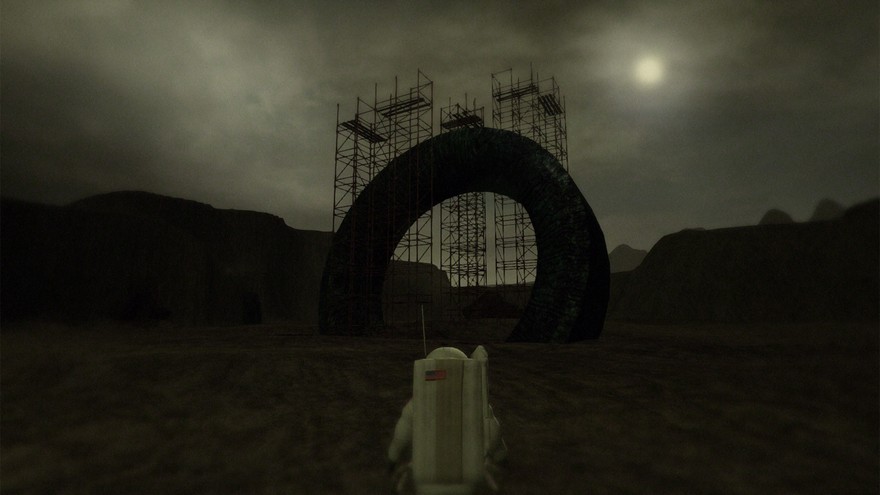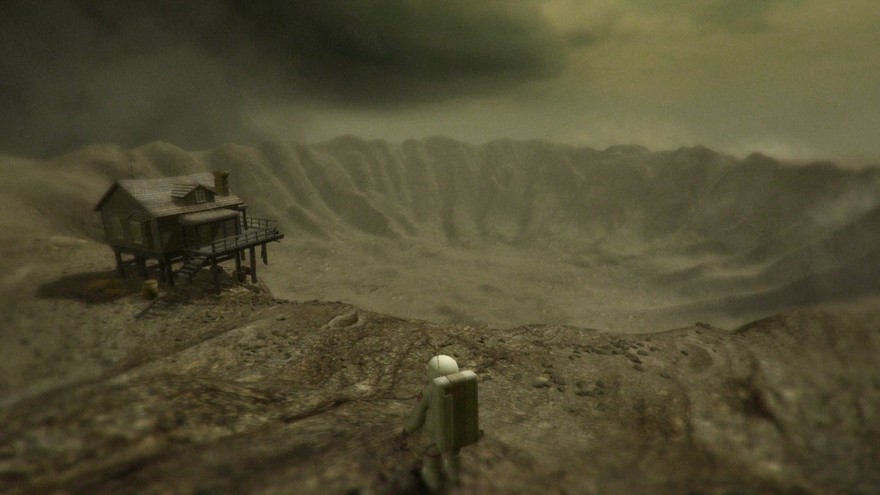Deep breath in, deep breath out.
The cackling of the radio attached somewhere in your suit is the only thing that can be heard over the rhythmic beating of your heart as you jump around the foreign terrain.
With every clomping step, you stare down at the new footmark engraved into the strange landscape, focusing on the breathing techniques taught before your adventure began.
Breathe in, breathe out.
Then suddenly, for some inexplicable reason, you raise your head and stare out over the vast black landscape, the illumination from nearby planets almost humming in vibration together.

As you stare out into the empty vastness of space you realize you are alone, and as the humming continues and your breathing evens out, you realize you have never been more serene.
“There’s a weird sense of fear and excitement I get when I think of space travel,” David Board, creator of Lifeless Planet says over the phone from his home in Alaska.
Lifeless Planet is an adventure exploration game that rips the player from the comfort of Earth and throws them into space’s gigantic grasp. The goal is to learn as much as he can about the seemingly uninhabited worlds and report back to NASA about his findings.
When he discovers a strange Russian laboratory on one the planets, however, he must venture out and face an unsettling fear, one Board confesses scares him more than anything else: the possibility that they are not alone in space, but co-exist with other groups of people.
For Board, the concept of contrasting the lonely horrors of space exploration and the tranquility of a one-man mission to discover other planets was always one of the main goals when he first started designing the game.
“You’re in a tiny tin can floating out in the middle of nowhere, with no gravity, and there’s always the possibility that you can run out of oxygen. Yet, there’s this beautiful, dark scene in space that’s mind-blowingly beautiful.”
Launched on Kickstarter in 2011, Lifeless Planet is akin to generation old titles like Dig, a Lucasarts point and click adventure game that sent astronauts to alien planets for archeological digs and Eco, a 3D life simulation Atari game from 1988. Both games, Board admitted, heavily influenced him as a designer.
One of the aspects of space Board was adamant about curating in his game was the isolation many astronauts would face if they were sent on a mission.
“Don’t get me wrong, I love games like Halo and Warhammer 40K: Space Marines, but most of the space games we have now are set when colonization has already occurred. I wanted to take the game back to before that actually happened.”
Most interesting, though, is Board’s fascination with exploring the psyche behind how different players will react to the often times cold and unpredictable long bouts of complete isolation.
Space, he says, is one of the best settings for people to face themselves and their fears.
“Space exploration is human beings seeking out something they’re missing, something they’re looking to fill. Are we the only ones in this galaxy, are there others out there,” he asks over the phone, pausing for a second. “The bigness of it all is one of the key parts to the game and the hardest to fathom for people.
“The whole premise of the story is being able to instantly realize just how small we are in this infinite galaxy.”

Although it’s not a unique way to look at space and exploration, Board admits it was a thought process he found himself confronted with after discovering H.P Lovecraft’s short stories. Lovecraft, Board said, understood the vast loneliness of realizing just how small we are in the neverending tunnel of time and space, and more importantly, just how peaceful realization that can be.
The difficulty came in having little to no dialogue to encompass all of the themes Board wanted to touch upon. To properly illustrate the mood he wanted to strike with players, he knew he was going to have to find a composer that understood the experience he wanted players to take away from the game.
Enter Rich Douglas, a 33-year-old composer from Texas who reached out to Board during the Kickstarter campaign and volunteered his work for the game.
“I knew music was going to be critical to the game, and the soundtrack that Rich created was perfect. Full of beautiful and haunting cello themes with underlying digital ambience that fit the game really well,” Board said.
Games set in space can be difficult to attach a soundtrack to, considering there isn’t a concrete sound associated with the vast galaxies. Ambient inducing sounds like those used in Carlo Castellano’s The Swapper soundtrack are often used to illuminate the experience for the player.
In order to evoke an emotion out of the player, a well-developed score is needed to replace the natural sounds that would otherwise exist.
“There’s nothing lonelier in space than quiet, and Rich’s soundtrack captures that in ways I didn’t think we would get,” Board admits.
The score is massive and adventurous, but thought provoking and calming all at the same time. At times, it feels like your chest is clenching as the score speeds up, while at other times, its mellow, eclectic sounds set the pace.
In order to create the unique sounds, Board said Douglas had to create his own instrument, a cross between a cello and a violin, that was able to capture all of the sounds he needed to properly set the mood.
“Rich was able to create the sounds that we needed to complete Lifeless Planet. It’s a combination of everything—the score, the design, the massive playable world—that people are really going to enjoy from their own homes.”
Space, after all angles are examined and deconstructed, can be terrifying. The likelihood of being able to visit another planet anytime soon without years of training is slim to none. Board understands this, and as he says, has hopefully been able to provide an exploration experience that isn’t as terrifying as actual space travel.
“It’s been a very long journey, full of time by myself away from the world,” Board says quietly. “But if I can give someone the feeling of exploring space, then all of the isolation will have been worth it.”
Breathe in, breathe out.
And leap.
